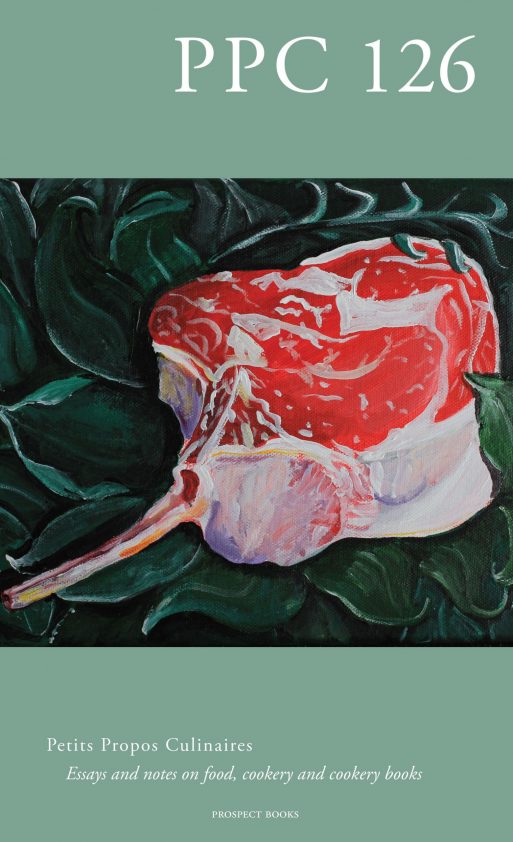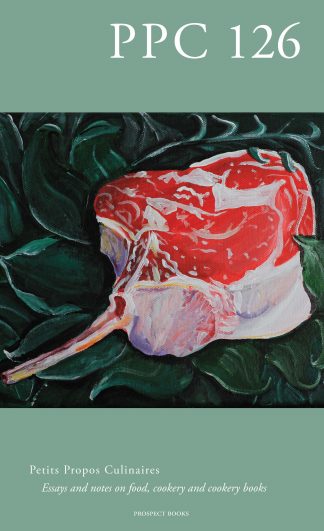Description
PPC 126 (August 2023)
Buy an individual article from this issue here or read article abstracts
|
PPC 126 contains articles ranging from black pudding to the first cook book by a black American woman, Mrs Russell, and between these two articles a memoir of working and food experiences in Turkey in the 1980s. Also an article on William Turner, not the painter but an English Protestant of the 16th century. His writings on natural history give us unique insights into early herbalists and their knowledge of the healing properties of plants.
A taster from – Another Author Driven to Desperation: The Elusive Malinda Russell and her Domestic Cook book by Blake Perkins
The Pathfinder
Although self-published, the fact that A Domestic Cook Book reached print is a considerable accomplishment. It was probably the first cookbook written by a black woman in the United States and Toni Tipton-Martin celebrates it in both The Jemima Code and Jubilee. She and others have found great merit in the little book, really but a pamphlet or perhaps booklet, running to some 36 pages. Tipton-Martin goes so far as to call it ‘an Emancipation Proclamation for black cooks.’
6 A website, www.malindarussell. com, describes her ‘fabulous recipes,’ especially the ‘uniquely varied dessert recipes,’ and aims to cook them all. Cherene Sherrard, who has attempted a number of the baked goods, has written a book of poetry, Grimoire, in magical-realist tribute to Mrs Russell.
A philosopher in the kitchen?
The most extravagant claims so far for A Domestic Cook Book appear in An Archive of Taste by Lauren Klein. She notes that ‘the recipes… contain only short descriptions of how to prepare each dish, as was typical for the genre at the time,’ and refers to ‘the sparseness that characterizes the recipe as a genre in the nineteenth century.’7
The repetition does nothing to dispel the inaccuracy of the claim about sparse recipes. Klein cannot have read many, perhaps any, other nineteenth century cookbooks or the considerable scholarship that describes them. Just over two decades before Mrs Russell, Eliza Acton revolutionized the genre with Modern Cookery for Private Families providing a clear, detailed sequence of operation for each preparation followed, except in her briefer recipes, by a list of its required ingredients and their proportions. By 1859, in the serialized precursor to her Book of Household Management (1861), Isabella Beeton had created the modern format by listing the measured ingredients ahead of the instructions. Each of those books became the bestselling kitchen manuals of their time in the United States as well as Britain.
Earlier authors from the American south also provide working recipes in contrast to many of the sketches from A Domestic Cook Book. Phineas Thornton’s Southern Gardener and Receipt Book, to cite a single relatively obscure example, appeared in 1839. His work predates Miss Acton’s so does not list ingredients but Thornton does provide more detailed and workable recipes than Mrs Russell.
In fact Glasse, writing farther back, more than a century earlier in 1747, and the bestselling cookbook author of her own age on both sides of the Atlantic, provides better working recipes than Mrs Russell. Hers is a primitive cookbook by the standard of its era, more comparable to seventeenth- and even sixteenth-century books than to most of its contemporaries.
In Klein’s telling the ‘Short History of the Author’ and ‘Rules and Regulations of the Kitchen’ that follow it, taken together, sound like a sophisticated opus. ‘Russell’s decision to leave was,’ she intones, ‘by all accounts not taken lightly.’ In fact no accounts, including the account of Mrs Russell, address how much thought she gave her decision. Klein claims that the pastry shop Mrs Russell operated in Tennessee had been ‘well-regarded’ but no opinion let alone record of the place exists.8
Klein claims to ‘connect… key culinary antecedents’ to A Domestic Cook Book including ‘the lived experience of Fanny Steward, the “colored cook, of Virginia” whom Russell credits with her culinary training and about whom little else is known.’ Nothing at all, however, is known about Steward other than the quoted passage from the Cook Book; her ‘lived experience’ is a mystery because no reference to her or record of her exists; and the term ‘culinary training’ elevates how Mrs Russell became a cook to a level she does not herself describe. ‘I learned my trade,’ she writes without more detail, ‘from Fanny Steward.’ 9 Klein attributes outsized significance to the statements of Mrs Russell that ‘I… am sure those using my receipts will be well satisfied’ and ‘they have always given satisfaction. 10 They appear among only about 360 words of text, over 150 of them the reproduction of an advertisement for a laundry Mrs Russell once ran. From that sparse and repetitive sales pitch, standard in its time, Klein simmers a substantial stone soup that requires twenty-one pages to describe. What it indicates, Klein insists, is a ‘philosophy of satisfaction.’ By ‘echoing’ her first reference to ‘satisfaction’ the Cook Book ‘signals the multiple lenses, philosophical as much as culinary or autobiographical, through which Russell’s cookbook can be read,’ although as Klein admits the ‘term satisfaction is never used again’ in the text.11 In the same passage she announces that Mrs Russell’s repetition of the term satisfaction ‘offers a counterpoint to the discourse of taste that [was] the focus of… the dominant culture of the time,’ an intellectual alternative to ‘philosophers such as Hutcheson and Hume’ along with ‘Washington, Jefferson, Madison, and Franklin.’12 It is remarkable how so economical a couple of phrases, or to be precise the repetition of a word, describes an alternative to the philosophies it required the Enlightenment counterparts to Mrs Russell thousands of pages to articulate.
Then Klein equates the ‘philosophy of satisfaction’ to an abortive 1800 slave revolt that envisioned an army of 10,000 marching on Richmond to take Governor James Monroe and others hostage, seize weapons stored at the city magazine and sue for freedom. According to Klein, ‘their shared emphasis on satisfaction, over and above personal taste, points to how the precarity that characterized all black lives in the early republic, both those enslaved and those free, shaped a range of personal philosophies and aesthetic expressions, from armed insurrection to “Almond Sponge Cake” (Russell, 9).’ Words fail.
13


